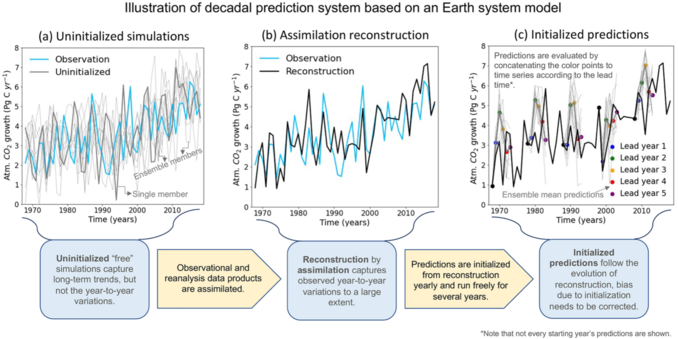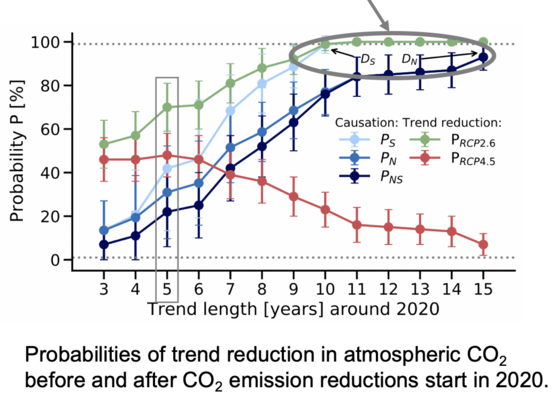Dr. Tatiana Ilyina 🌍🌊 O=C=O 💙💛 · @TatianaIlyina
1540 followers · 1107 posts · Server mas.toCan we predict if atmospheric CO2 grows faster or slower than what is expected from emissions' growth?
Yes, by assimilating observational data into an #ESM, we gain a predictive skill of 5 years for the air–sea CO2 flux, and 2 years for the air–land CO2 flux and atmospheric carbon growth rate.
Find out more on how we predict the global carbon cycle and evaluate modeled atmospheric CO2 in our new study:
https://esd.copernicus.org/articles/14/101/2023/
led by @HongmeiLi at my group @MPI_Meteo
Dr. Tatiana Ilyina 🌍🌊 O=C=O 💙💛 · @TatianaIlyina
1470 followers · 1023 posts · Server mas.toWhen we start cutting CO2 emissions, when will atmospheric CO2 concentration go down?
On decadal timescales, the effect of emission changes is masked by natural climate variability modes (like El Niño-Southern Oscillation).
We show that natural variability disguises attribution of reduced atmospheric CO₂ growth to CO₂ mitigation for up to a decade.
Atmospheric CO2 can even rise faster despite falling emissions (~30% chance).
Dr. Tatiana Ilyina 🌍🌊 O=C=O 💙💛 · @TatianaIlyina
1038 followers · 669 posts · Server mas.toOur paper on the application of component concurrency allowing to improve the scalability of simulations and reduce the real-runtime for biogeochemical tracers' computation is now published 🎉
https://gmd.copernicus.org/articles/15/9157/2022/
Learn more why we find it exciting:
https://mas.to/@TatianaIlyina/109471706342238360
Dr. Tatiana Ilyina 🌍🌊 O=C=O 💙💛 · @TatianaIlyina
1038 followers · 669 posts · Server mas.toWith my group, I study a #CDR method of artificially increasing ocean C-sink by adding alkalinity.
In an #EarthSystemModel
large amounts of alkalinity boost the oceans' capacity to absorb CO2.
This comes at a price of unprecedented perturbations in #biogeochemistry with unknown implications for marine life.
Learn more in our papers
https://doi.org/10.1002/2013GL057981
https://doi.org/10.1002/2016GL068576
https://doi.org/10.1029/2018GL077847
https://doi.org/10.1002/2017EF000620
https://doi.org/10.3389/fclim.2021.624075
https://doi.org/10.1029/2020EF001634
#ilyinascience #biogeochemistry #EarthSystemModel #cdr
Dr. Tatiana Ilyina 🌍🌊 O=C=O 💙💛 · @TatianaIlyina
1038 followers · 669 posts · Server mas.to@derp_code
yep, thinking of introducing a hashtag like #ilyinaScience and add it in my toots 😆


